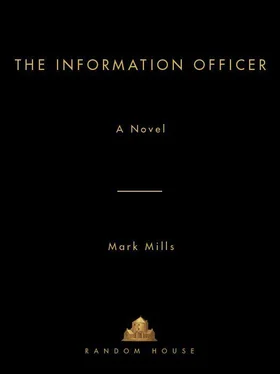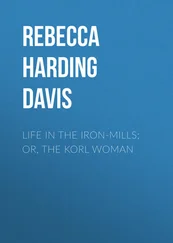Mark Mills - The Information Officer
Здесь есть возможность читать онлайн «Mark Mills - The Information Officer» — ознакомительный отрывок электронной книги совершенно бесплатно, а после прочтения отрывка купить полную версию. В некоторых случаях можно слушать аудио, скачать через торрент в формате fb2 и присутствует краткое содержание. Жанр: Старинная литература, на русском языке. Описание произведения, (предисловие) а так же отзывы посетителей доступны на портале библиотеки ЛибКат.
- Название:The Information Officer
- Автор:
- Жанр:
- Год:неизвестен
- ISBN:нет данных
- Рейтинг книги:5 / 5. Голосов: 1
-
Избранное:Добавить в избранное
- Отзывы:
-
Ваша оценка:
- 100
- 1
- 2
- 3
- 4
- 5
The Information Officer: краткое содержание, описание и аннотация
Предлагаем к чтению аннотацию, описание, краткое содержание или предисловие (зависит от того, что написал сам автор книги «The Information Officer»). Если вы не нашли необходимую информацию о книге — напишите в комментариях, мы постараемся отыскать её.
The Information Officer — читать онлайн ознакомительный отрывок
Ниже представлен текст книги, разбитый по страницам. Система сохранения места последней прочитанной страницы, позволяет с удобством читать онлайн бесплатно книгу «The Information Officer», без необходимости каждый раз заново искать на чём Вы остановились. Поставьте закладку, и сможете в любой момент перейти на страницу, на которой закончили чтение.
Интервал:
Закладка:
At dinner, Max had been a little put out to find himself seated next to Teresa at one end of the long table, while a handsome and amusing young captain with the 2nd Battalion Cheshire Regiment monopolized Lilian at the other end. He drew some consolation from the fact that Teresa appeared to know a fair amount about him already, although this didn’t stop her from quizzing him further. She was an attractive woman with a ready laugh and large eyes made for drawing confidences from strangers, especially ones who had consumed too much fine red wine.
He told her about his life back home in England, about the big house in Oxfordshire where he had grown up, the farm that came with it, and the fields and woods and lakes that had served as his playground when he was a boy. She wanted more, though. What was his father like? A modest, soft-spoken man. Kindhearted, if slightly remote. And his mother? She was dead. How? In childbirth. Giving birth to him.
Silence. The same awkward silence that always followed this revelation, as if people were weighing in their minds the exact extent of his culpability. But Teresa was different.
“How terrible that you did not know your mother.”
“I couldn’t say. I’ve nothing to compare it with.”
“Are her family still in your life?”
“They’re French. She was French.”
“And her name?”
It didn’t come readily to his lips. In fact, he couldn’t remember the last time he’d uttered it.
“Camille.”
He was too far in by now to extract himself, so he told her the story, in so much as it had been handed down to him. His father, the youngest of three sons, had always harbored dreams of being a painter, dreams that had carried him to Paris against the wishes of his parents. The advent of war, along with a creeping recognition of his own creative limitations, conspired to foul his plans, and in 1914 he returned to England with his French bride—the daughter of a notary who had lived in the same apartment building in Paris. Both of his brothers were dead within a year. Miraculously, he survived the Western Front to find himself first in line, the sole heir, to a small estate north of Oxford.
It was the kind of life Max’s father had never wanted or imagined for himself, but Camille’s death in childbirth a short while later sealed his fate. A number of local ladies pounced on him, and he was too disorientated and weak—yes, weak—to repel the pushiest candidate.
“Your stepmother?”
“Sylvia.”
“How old were you?”
“Too young to remember.”
This was a lie. Strange and mildly unsettling memories still came to him from time to time, static images, snapshots, cold and stark and remote: the high shine of his father’s shoes on the day of the wedding … a faceless woman dressed all in white and framed in a doorway … his nanny holding him at the nursery window, watching the wedding party return from the church. Whether or not they were reliable memories, he couldn’t say. It was quite possible that his brain had assembled them from photographs and hearsay. He knew for a fact, however, that Sylvia had insisted he shouldn’t attend the ceremony.
“Did they have children?”
“I have a half brother and sister, not much younger than me. Roland and Elizabeth. Elizabeth’s a fine woman.”
“And Roland?”
Max hesitated, reaching for his wineglass. Idle. Overweight. Overbearing. Cruel.
“Roland’s all right.”
Any pretense of a relationship had disappeared long ago, when Roland—not for the first time—had referred to Max’s mother as “that French whore.” Dr. Tomkins, the local GP, had done a good job of resetting Roland’s nose, although it still veered a little to the left when viewed in certain lights.
Even as he had landed that punch, Max had known that Roland hadn’t been wholly to blame, that he had only been parroting the words of his mother. Sylvia had worked tirelessly over the years to drive a wedge between Max and her own son. Everyone knew the reason why. Everyone knew what was at stake.
Max had toyed with the idea of forgoing his birthright, of stepping aside and allowing the estate to pass to Roland—and maybe he still would—but prolonging their distress offered some small satisfaction for their hostile treatment of him over the years, the injustice of which still filled him with impotent and uncomprehending anger in his darker moments.
He labored under no illusions—he’d had a privileged upbringing, and to complain about it seemed somehow perverse—but he had always felt himself very much alone in the world, and he held Sylvia and Roland largely to blame for this. His father was exonerated on the grounds that he had never given Max cause to doubt their special bond. They shared many of the same interests. Whether it was facing each other across a chessboard or fiddling with the guts of some motorcycle or casting flies for trout on the river, they both knew that those private moments were more about reinforcing their silent alliance than about the activity itself. They discussed literature and art and films, and all the other things that Sylvia deemed too trivial to be aired at the dinner table, such as the book his father had been working on for the past ten years or more.
It was a biography of the young Frenchman Jean-François Champollion, who, in spite of his lowly origins, had won the race to decipher the Egyptian hieroglyphs, beating the most eminent orientalists in Europe to the coveted prize. It was a story well worth telling, but why his father should have devoted so many years of his life to the subject was anyone’s guess. Max suspected it was something to do with the idea of a young man setting his sights on a goal and persevering in the face of insuperable odds—something his father had failed to do. He also suspected that the book would never be completed, because if it ever were, his father would no longer have an excuse to potter off to the London Library or the British Museum on the train.
Max had had no intention of sharing any of this with Teresa, but the words had just tumbled from his lips, almost as if he were under the spell of some sorceress, which he began to think he might be.
“Maybe he has a lover in London,” Teresa remarked.
“That’s … well, an unexpected observation.”
“Why?”
“From a Catholic.”
“Say what you like about us Catholics, but we understand human weakness.” She gave a knowing smile. “And I see from your face that the idea is not such a bad one for you.”
No, it wasn’t: his father stealing a few moments of happiness in the arms of a lady friend. He just felt a little foolish that it hadn’t occurred to him before.
Meanwhile, down at the other end of the table, the captain from the Cheshires was evidently doing a good job of entertaining Lilian, judging from her laughter. A few weeks before, it wouldn’t have mattered to him. Now it did. So much so that when the evening finally broke up, he was quite ready to leave, to be gone. That impulse vanished the moment Lilian asked him to stay on a while longer. There was a work matter she needed to discuss with him.
It was a chilly, clear night, and she held her woolen cardigan tight around her shoulders as they strolled in the palace garden, their feet crunching softly on the gravel pathway.
“You looked like you were enjoying yourself with the blond Adonis from the Cheshires.”
“Tristran.”
“Of course. How could I forget?”
“He’s very brave.”
“Really?”
“Yes, he told me.”
In the darkness he could just make out the gleam of her teeth.
“You know what? He probably is. The Cheshires have had the dirty end of the stick for quite a while.”
“You’re defending him?” she asked.
Читать дальшеИнтервал:
Закладка:
Похожие книги на «The Information Officer»
Представляем Вашему вниманию похожие книги на «The Information Officer» списком для выбора. Мы отобрали схожую по названию и смыслу литературу в надежде предоставить читателям больше вариантов отыскать новые, интересные, ещё непрочитанные произведения.
Обсуждение, отзывы о книге «The Information Officer» и просто собственные мнения читателей. Оставьте ваши комментарии, напишите, что Вы думаете о произведении, его смысле или главных героях. Укажите что конкретно понравилось, а что нет, и почему Вы так считаете.










